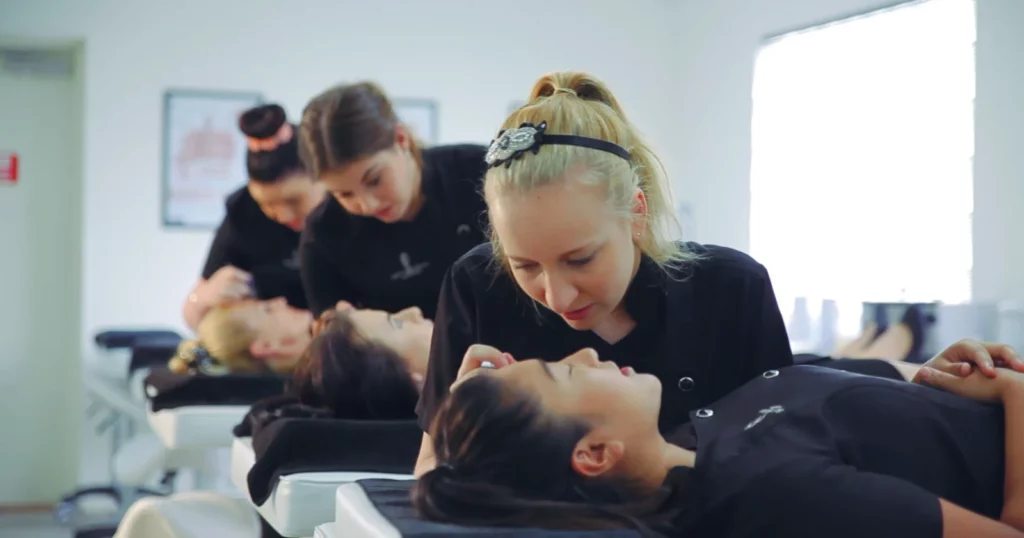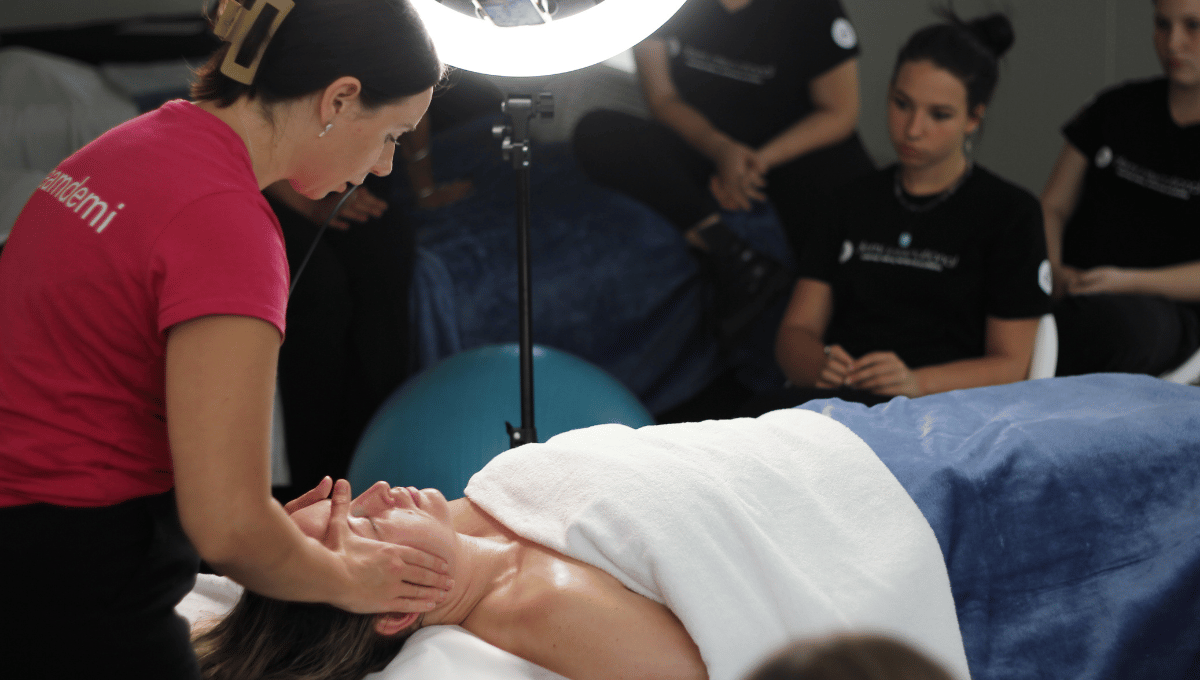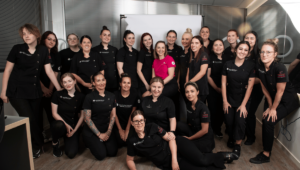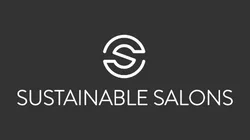Are you passionate about all things beauty and skincare? Dreaming of a career in the booming beauty industry? Wondering how to become a beauty therapist and how long it could take to start working?
In Australia, a Certificate III is the minimum requirement for becoming a qualified beauty therapist, plus relevant work experience. Although not a heavily regulated industry, clients and employers expect beauty therapists to be qualified to provide these services.
To learn more about these beauty professionals, including how to become a beauty therapist, we do a deep dive into the career and its opportunities. You’ll discover what the role entails, what it takes to become qualified, and the courses offered by Demi International that can take you there.
What does a beauty therapist do?
Before you can set your plan in motion, you need to ensure that beauty therapy is the career you want. With other similar professions in the industry — like cosmetologist and esthetician — the role of a beauty therapist can sometimes be misunderstood.
So, what does a beauty therapist do? Typically, they perform services on the faces and bodies of their clients, with an overall goal of improving appearance and skincare wellbeing. As a broad and varied role, though, these experts can perform many treatments and services in an average week, including:
- Skincare analysis and treatments, including facials and masks.
- Hair removal treatments such as depilation, electrolysis, and waxing.
- Nail treatments, manicures, pedicures, decorative nail art, and artificial nail application.
- Massages, spray tanning, and other body treatments.
- Makeup and cosmetic application.
The specific duties of the role are determined by the beauty therapist and their place of work. Some provide clients with a broader scope of services; others prefer to specialise in one or two areas. This flexibility means the career options for a beauty therapist can be extensive.
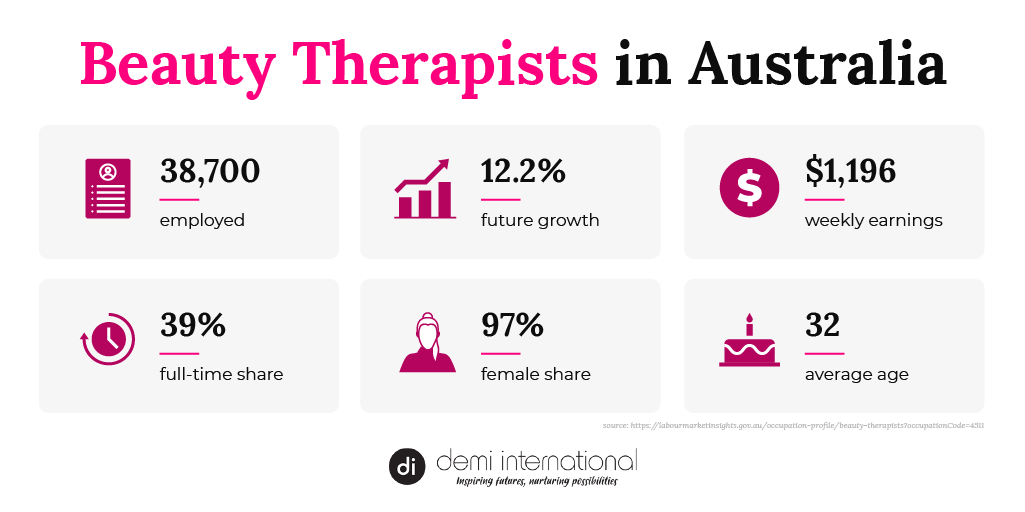
Career options for beauty therapists
As a qualified beauty therapist, countless professional opportunities await. Depending on your experience, training, and passion, these are some exciting careers you can pursue.
-
Nail technician
Focusing on the nails, these technicians provide manicures, pedicures, nail art, and application. Nail technicians complete courses like a Certificate III in Nail Technology, and when combined with a generalist beauty therapy qualification, have access to even more career paths.
-
Film and theatre makeup artist
Those interested in pursuing a career in film and theatre makeup can bring their beauty therapy and cosmetic abilities to the industry. The Diploma of Screen and Media Makeup equips graduates with the skills to apply creative hair and makeup, including special effects makeup, to those on the stage and screen.
-
Salon owner
Many beauty therapists go on to start their own businesses and may eventually own or manage a salon. This role combines the technical elements of beauty therapy with business management and is a popular career goal for many.
-
Beauty therapist
As an all-rounder beauty therapist, you can work in spas, salons, and run your own business. With a wide range of services and treatments to offer your clients, you’ll be regarded as a specialist in all areas of beauty therapy.
How much do beauty therapists earn in Australia?
According to Seek, a beauty therapist in Australia earns between $55,000 and $70,000 a year. However, factors including employer, work location, hours, area of expertise, and experience can impact your earning potential.
Likewise, the salary of a beauty therapist working in a self-employed capacity or running a business can also vary. These self-employed professionals enjoy benefits such as flexible hours and dictating their charges and fees but will have costs and factors to consider.
What qualifications are required to become a beauty therapist?
A nationally recognised beauty therapy qualification is required to become a beauty therapist in Australia. Although the beauty industry is not as heavily regulated as others, employers, clients, and professional peers look favourably upon a suitably trained and qualified beauty therapist.
At a minimum, hopeful beauty therapists should hold at least a Certificate III in Beauty Therapy to be considered for roles. With an understanding of the type of beauty therapy you wish to practice, you can find a suitable study pathway.
Certificates
A Certificate III is the minimum qualification to perform skilled work in many industries, including beauty therapy. Depending on study load, these courses can be completed in around six months.
Students wishing to pursue an all-embracing career in beauty therapy can complete a dual certification. For example, the Certificate III in Beauty with Makeup Specialty is a dual qualification offered by Demi International that teaches beauty therapy and makeup application.
Diplomas
A diploma is considered Australia’s highest, nationally recognised course for beauty therapists. Usually taking 12 months to complete, Demi International’s Diploma of Beauty Therapy provides graduates with the fundamentals of beauty therapy, including technical skills and knowledge.
Additionally, those pursuing further studies or starting a business can use their diploma as a jumping-off point. Our Diploma of Salon Management is ideal for taking the step from beauty therapist to salon owner and can also be studied as a dual diploma.
Certifications and supplementary training
Beyond the traditional qualifications, there are always opportunities to upskill or specialise in services. Other popular short courses for beauty therapists include the Maintain Infection Control and Laser Safety Course options, depending on the treatments they wish to provide.
How long does it take to become a beauty therapist?
There’s no set timeline on how to become a beauty therapist. Depending on the training and education one pursues, and the timeframe for completing them, you can become a qualified therapist in two to three years.
As the treatments and science behind skincare and beauty therapy constantly evolve, today’s beauty therapists require ongoing training and upskilling. A commitment to lifelong learning is essential to ensure your skills remain relevant and you can deliver the best service to clients.
Essential skills for becoming a beauty therapist
Beyond the education and training requirements, you might wonder if you have what it takes to become a beauty therapist. For most, a passion for beauty and skincare piques their interest. However, these skills are also helpful in forging a successful career as a beauty therapist.
- Communication: In a client-facing business such as beauty therapy, communication skills are critical. Being a gentle and respectful communicator, addressing people’s concerns and questions, and providing a high level of customer service are necessary.
- Time management: Managing a busy schedule with numerous appointments, in addition to the other duties, is a significant part of the beauty therapist role.
- Dexterity: Fine motor skills, attention to detail, and efficient movements allow these experts to provide beauty services at an expert level.
- Creativity: With services like nail design, makeup application, and cosmetic tattoos, a beauty therapist should feel comfortable being creative and harnessing their artistic flair.
Working as a beauty therapist in Queensland
With a booming beauty industry, career prospects are good. According to the government’s Labour Market Insights, beauty therapists will experience a strong projected job demand growth of 12.2% in the lead-up to 2026.
Once qualified, you can pursue countless career opportunities in the beauty industry. Demi International’s job board is an up-to-date resource with current beauty therapy positions within Australia, giving you a good idea of what to expect in the job market.
Alternatively, working for yourself is one of the most significant benefits of a career as a beauty therapist. However, if the thought of starting your own beauty business is appealing, here are a few things to consider first.
- Work location. Do you plan to run your salon from home, provide a mobile service, or lease a property? Each of these setups requires a unique approach to starting a business.
- Services provided. Which services do you hope to provide for your clients? Do you have the resources to do so? And what will you charge to earn a profit?
- Laws, tax, insurance, and other official business. Starting a business involves permits, licenses, and registrations, among other things. Ensure you’ve covered every official requirement in your planning process.
Begin your career in beauty therapy
Demi International offers nationally recognised courses to help you launch your career in beauty therapy. As a rewarding, flexible, and ever-changing profession, there are many exciting opportunities to explore as a qualified beauty therapist. Speak to our friendly course advisors to discover what’s possible.

